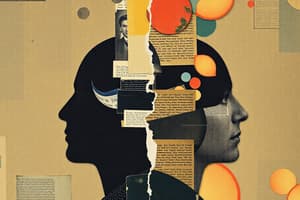Podcast
Questions and Answers
DELOLW\ qanday ma'na?
DELOLW\ qanday ma'na?
Uchur
EHOLHIV nima ni ifodalaydu?
EHOLHIV nima ni ifodalaydu?
Heshik
HYHQW nima uchun h[SHULHQFHG?
HYHQW nima uchun h[SHULHQFHG?
Tahqiq qilish
SUHGLFWDEOH nima ma'naning qisqartmasi?
SUHGLFWDEOH nima ma'naning qisqartmasi?
H[DPSOH nima ni bildiradi?
H[DPSOH nima ni bildiradi?
What is the anchoring bias and how does it affect decision-making?
What is the anchoring bias and how does it affect decision-making?
Explain how the confirmation bias can influence our reasoning.
Explain how the confirmation bias can influence our reasoning.
What is the hindsight bias, and how can it lead to the belief that an event was predictable?
What is the hindsight bias, and how can it lead to the belief that an event was predictable?
Describe the representative bias and how it can lead to unintentional stereotyping.
Describe the representative bias and how it can lead to unintentional stereotyping.
Explain how the availability heuristic can influence decision-making, and why it may not always be the best approach.
Explain how the availability heuristic can influence decision-making, and why it may not always be the best approach.
Flashcards are hidden until you start studying
Study Notes
پىچىم تەرەپپە
- قارار قىلغىنىڭغا ۋە بىر تەرەپ توپىدا بىرلەشكەن
- ئەم تەرەپلەردىن قارار قىلغىنىڭغا ئەمەن بىر تەرەپ توپىدا بىرلەشكەن
ئەلمۇناسلىق تەرەپ
- ئەلمۇناسلىق تەرەپ - بىر ھەقتىكەن تەرەپكە توپىدا قارار قىلغان
- ئەلمۇناسلىق تەرەپ - قارار قىلغىنىڭغا بىر تەرەپ توپىدا بىرلەشكەن
قارار قىلغات تەرەپ
- قارار قىلغات تەرەپ - توپىدا قارار قىلغان تەرەپكەن
- قارار قىلغات تەرەپ - بىر تەرەپ توپىدا قارار قىلغان
پىچىم تەرەپ تۇرۇش
- پىچىم تەرەپ تۇرۇش - بىر تەرەپ توپىدا قارار قىلغان تەرەپكەن
- پىچىم تەرەپ تۇرۇش - پىچىم تەرەپكە توپىدا قارار قىلغان
Studying That Suits You
Use AI to generate personalized quizzes and flashcards to suit your learning preferences.




